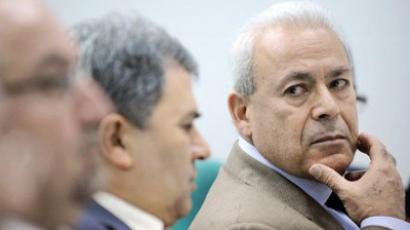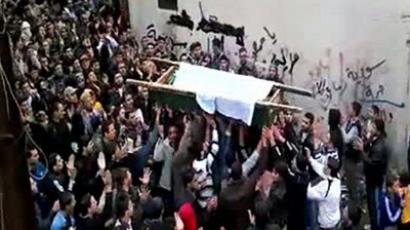Libyan in(ter)vention: False facts fatal for Gaddafi
Sanctions against Syria and looming prospects of an intervention into the country are drawing ever more parallels with the war in Libya. But as it turned out, the “facts” used to wage a “humanitarian war” on Tripoli, underwent almost no verification.
“There’s no evidence to justify the humanitarian war in Libya,” is the conclusion of filmmaker and independent journalist Julien Teil.“In the beginning of this story, we got some allegations which have been looked at and said to the UN Human Rights Council and those allegations had never been verified or checked,” he told RT's Tesa Arcilla.” And these had been used also as material for the ICC case against Libya.”On March 17, UN Security Council Resolution 1973 was passed, imposing a no-fly zone over Libya. Accusations were that Gaddafi had bombed his own people from air and land, used foreign mercenaries, ordered the use of rape as a weapon, and killed by the thousands.“I can’t prove there was no bombing. All I know is that there is no evidence of bombing,” says Julien Teil. “So I interviewed the man who went to the UN Human Rights Council, Sliman Bouchuiguir.”Sliman Bouchuiguir was the former Secretary General of the Libyan League for Human Rights and is now the Libyan ambassador to Switzerland in Bern.On February 25, he went to the UN Human Rights Council to present his organization’s allegations of crimes against Gaddafi’s government. In that session, a decision was taken to freeze Libya’s membership of the Council.He underlined the number of deaths: 6,000, including 3,000 in Tripoli alone. When Julien asked Bouchuiguir how these claims can be verified, he pointed to the former rebels – now Libya’s government – as his source.“I got that information from the Libyan prime minister. Mr. Mahmoud of the Warfallah Tribe who was on the other side of the National Transitional Council was the one who gave me these numbers.” he stated. Yet there are still those who defend the Libyan intervention, like a former French intelligence officer. “We clearly have in this case the fog of war. It is very likely that some crimes attributed to Gaddafi were false or exaggerated,” Claude Moniquet told RT. “But we had all the record of Gaddafi for 40 years and Gaddafi was a terrorist, was a criminal.” On June 27, International Criminal Court Prosecutor Luis Ocampo Moreno’s request for arrest warrants for Muammar Gaddafi, his son Saif al-Islam and his intelligence chief was granted. Julien Teil went through the pages of the arrest warrant application, most of which were redacted. Among the pages open to the public were lists of articles to support the case, one of which was Bouchuiguir’s February 25 speech – the one based on information Bouchuiguir himself said he got from the NTC, with no evidence or documents to back the staggering numbers. But those who raised questions risked being accused of taking the side of a man seen as a brutal dictator, already labeled by some world powers as “the bad guy”. “I think that is absurd. If you are against declaring war on a country, it’s not because you like the government,” argues author Diana Johnstone. “So I’m sorry, it’s up to the ones who make the accusation to come up with the proof unless we’re just reversing the whole process of civilization and law.”But international law, even cheerleaders of the intervention admit, tends to be sacrificed. “I will tell you something which is not politically correct,” Claude Moniquet, confessed to RT. “I don’t believe so much in international law. It’s just a tool used in one hand and on the other hand for political purpose.”Regardless, Julien’s point is simply this: with such legal systems in place, any claims, first and foremost, should be thoroughly investigated. And with UN set to hold a special session on Friday to discuss a report into the human rights abuses in Syria, this point, he hopes, will be heard before the next “humanitarian war” is waged.















